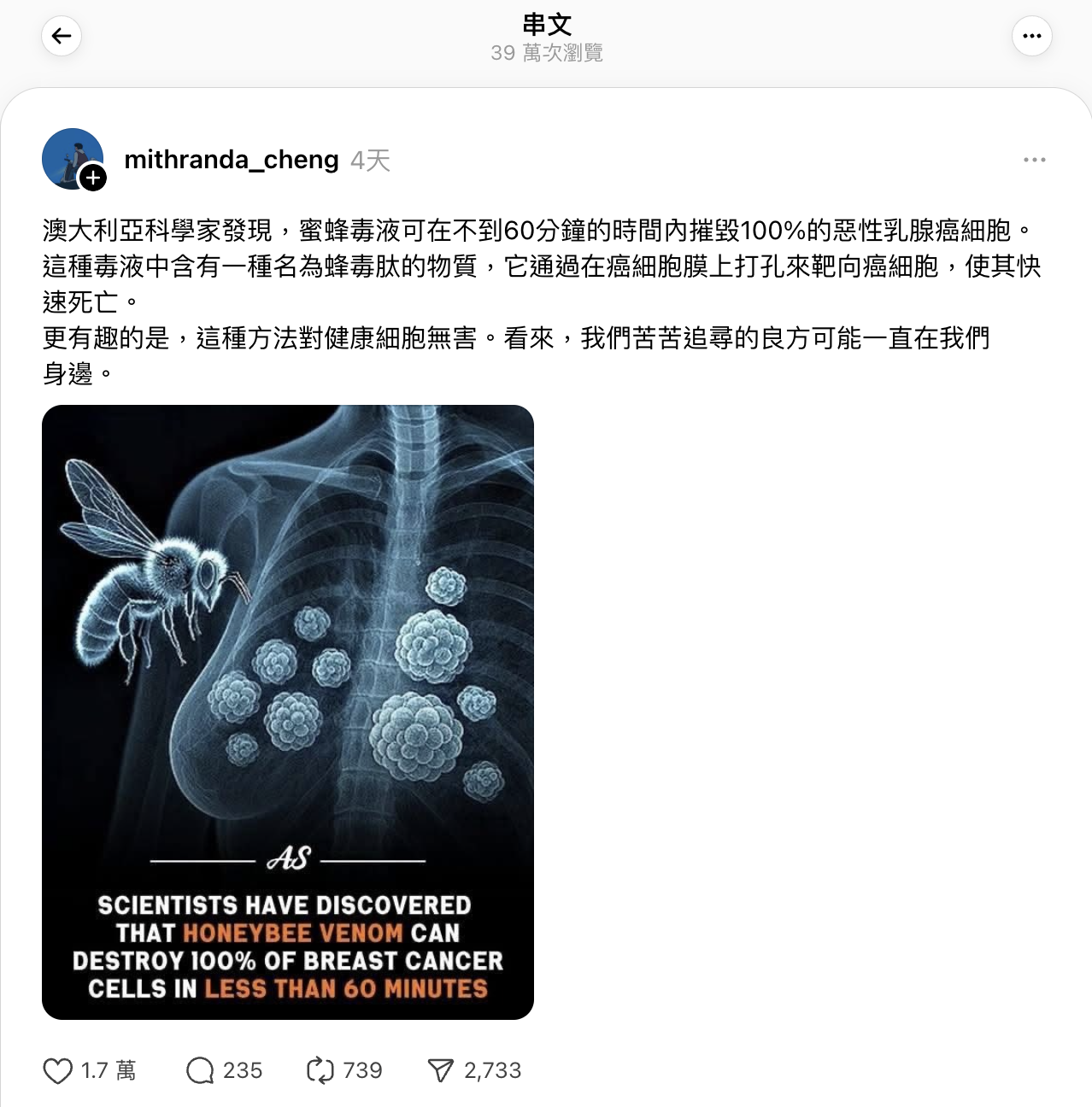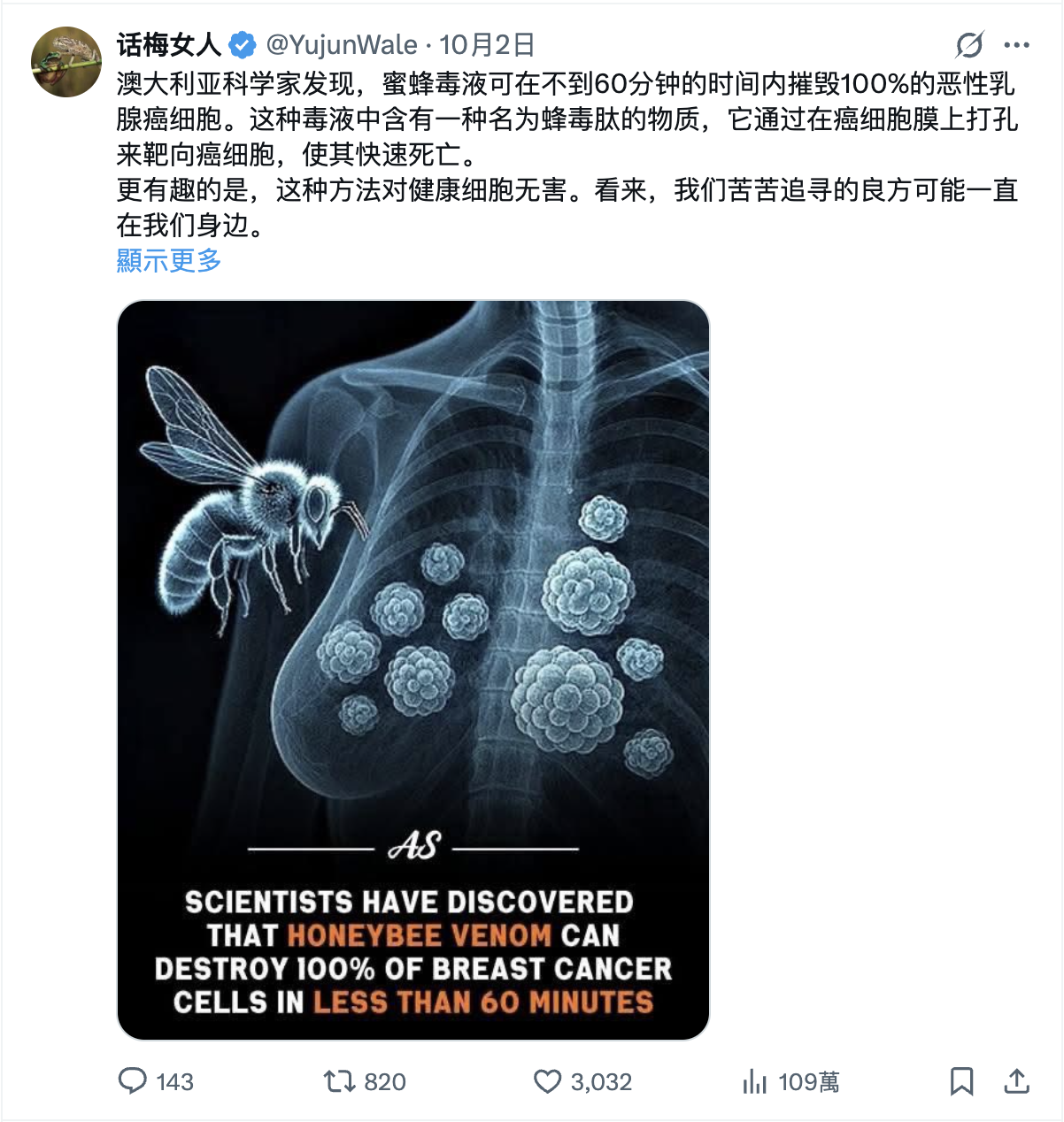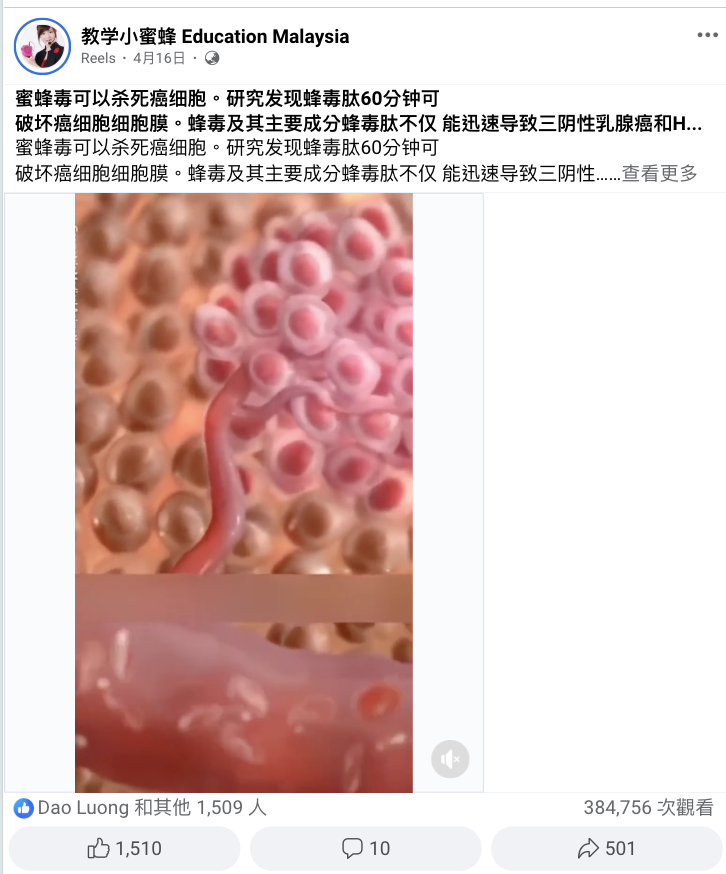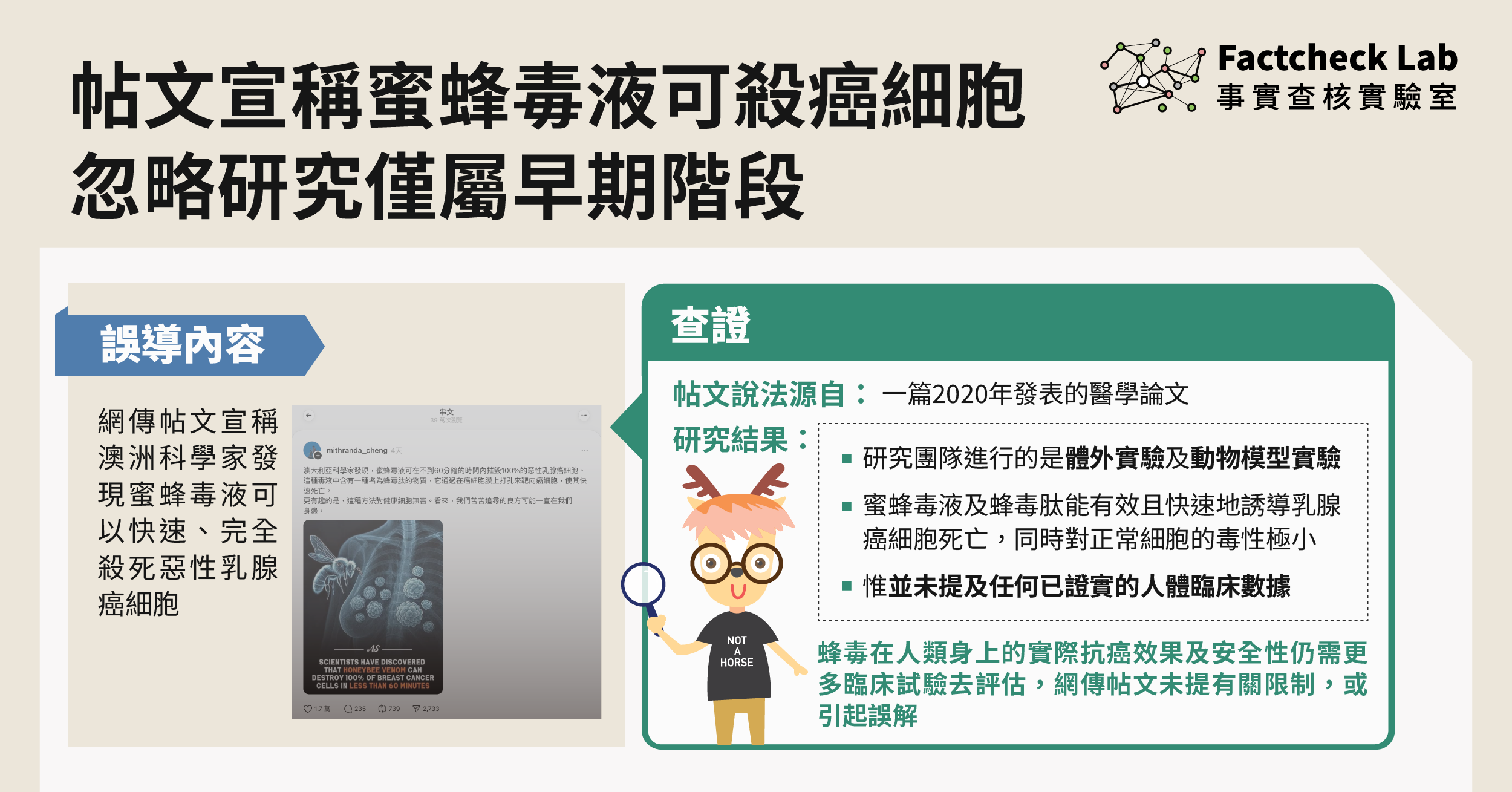摘要
- 社交媒體上流傳帖文宣稱澳洲科學家發現蜜蜂毒液可以快速、完全殺死惡性乳腺癌細胞。
- 帖文說法基於一篇於2020年發表的醫學論文。
- 該論文提及在體外實驗及動物模型中蜜蜂毒液及蜂毒肽能有效且快速地誘導乳腺癌細胞死亡,同時對正常細胞的毒性極小,但論文中並未提及任何已證實的人體臨床數據。
- 有關研究僅為體外實驗及動物模型實驗結果,蜂毒在人類身上的實際抗癌效果及安全性仍需更多臨床試驗去評估。
- 網傳帖文未有提及有關限制,包括研究處於早期階段,實驗結果尚未在人類患者身上驗證,或會引起誤解。
背景
2025年10月3日,Threads用戶「mithranda_cheng」發佈帖文,宣稱有澳洲科學家發現蜜蜂毒液「可在不到60分鐘的時間內摧毀100%的惡性乳腺癌細胞」,並且對健康細胞無害。該帖文獲得1.7萬個讚好、235個留言、3472次分享及約39萬次瀏覽。[1]
相似內容在社交媒體廣泛流傳。X用戶「话梅女人」於10月2日發佈相似內容,帖文獲得逾109萬次查看、3,035個讚好、822次轉發、143個留言及1,450個收藏。[2]4月16日,Facebook用戶「教学小蜜蜂 Education Malaysia」發佈類似說法的影片,並提到蜂毒及其主要成分蜂毒肽可以「迅速導致三陰性乳腺癌及HER2陽性乳腺癌細胞死亡」。影片獲得約1,500個表情反應、10個留言、501次分享及逾38萬次觀看。[3]



查證
在Google搜尋「Australia bee venom breast cancer」,可發現2020年9月2日澳洲哈里·珀金斯醫學研究所(Harry Perkins Institute of Medical Research)發佈新聞稿,提及該研究所的杜菲博士(Dr. Ciara Duffy)曾進行相關研究。[4]文中引述杜菲表示,研究團隊測試了蜜蜂毒液(honeybee venom)及當中的蜂毒肽(melittin)對數種乳癌細胞的影響,發現蜜蜂毒液及蜂毒肽均顯著降低三陰性乳癌(triple-negative breast cancer)及HER2陽性乳癌細胞的活性。[5]該新聞稿又指特定濃度的蜜蜂毒液可導致100%癌細胞死亡,同時對正常細胞的影響極小,並引述杜菲表示:「我們發現蜂毒肽能在60分鐘內完全破壞癌細胞的細胞膜。」[6]
回顧2020年9月刊登在Nature旗下期刊《npj Precision Oncology》的研究,可發現2020年9月1日發表的研究論文。文章作者共有13人,其中11人隸屬於澳洲的研究機構,第一作者為杜菲博士。[7]上述新聞稿内容与该文章相符。但是,研究團隊所進行的是體外實驗(in vitro)[8],以及在實驗用小鼠身上進行同種移植模型(allograft model)的動物模型實驗(animal model and treatments)。[9-10]此論文中並未提及任何已證實的人體臨床數據。
在Google搜尋「Ciara Duffy bee venom breast cancer」,可發現2020年9月2日《BBC》的報導。報導提及雖然研究團隊對實驗結果感到興奮,但也提示公眾,還需要更多研究來確定蜜蜂毒液是否可以被開發為抗癌藥物,大規模發揮作用。悉尼加文醫學研究所(Garvan Institute of Medical Research in Sydney)的副教授Alex Swarbrick也提醒,許多化合物可以殺死實驗培養皿或小鼠體內的乳癌細胞。但從這些發現到能夠在臨床實踐驗證成果,還有很長的路要走。[11]
一篇刊登在《Translational Medicine Communications》的综述指出,許多因素會導致臨床前的實驗室體外實驗結果無法在人體中再現[12,13],例如實驗室器皿的塗層類型、細胞培養的溫度或培養基的酸鹼值(pH)與成分等細微差異的影響等。[14]
一篇刊登在《American Journal of Translational Research》的綜述提及,動物模型實驗結果在臨床試驗中驗證的平均成功率不到8%,動物模型實驗只能有限模擬人類患癌及癌症發展這一極其複雜的過程。[15,16]
在「Google學術搜尋」搜尋「bee venom melittin cancer treatment」,結果按日期排序回顧發佈於2024年以後的文章,可發現2024年11月刊登在《Pharmacological Research》的綜述。[17]文章提及目前相關蜂毒研究提供具潛力的研究方向,但仍須透過臨床試驗全面驗證相關成分對人類是否安全、有效。[18]
另外,在Google搜尋「bee venom cancer fact check」,可以發現《USA Today》2023年發佈的事實查核報告。相關帖文同樣引用杜菲博士的研究作為依據,宣稱「癌症患者應該接受蜜蜂叮咬以殺死癌細胞」。《USA Today》判定該說法錯誤,並提醒研究處於實驗室探索階段。[19]
綜上所述,網傳說法未有提及相關研究處於臨床研究前的體外實驗及動物模型階段,實驗結果尚未在人類患者身上驗證。
結論
社交媒體上流傳帖文宣稱澳洲科學家發現蜜蜂毒液可以快速、完全殺死惡性乳腺癌細胞。
帖文說法基於一篇於2020年發表的醫學論文。該論文提及在體外實驗及動物模型中蜜蜂毒液及蜂毒肽能有效且快速地誘導乳腺癌細胞死亡,同時對正常細胞的毒性極小,但論文中並未提及任何已證實的人體臨床數據。
有關研究僅為體外實驗及動物模型實驗結果,蜂毒在人類身上的實際抗癌效果及安全性仍需更多臨床試驗去評估。
網傳帖文未有提及有關限制,包括研究處於早期階段,實驗結果尚未在人類患者身上驗證,或會引起誤解。
資料來源
- Threads用戶「mithranda_cheng」帖文,Perma.cc備份網頁
- X用戶「话梅女人」帖文,Archive.today備份網頁
- Facebook用戶「教学小蜜蜂 Education Malaysia」影片,Archive.today備份網頁
- Honeybee venom kills breast cancer cells (The Harry Perkins Institute of Medical Research),Wayback Machine備份網頁
- 見[4],相關段落原文為“We tested honeybee venom on normal breast cells, and cells from the clinical subtypes of breast cancer: hormone receptor positive, HER2-enriched, and triple-negative breast cancer.”、“We tested a very small, positively charged peptide in honeybee venom called melittin, which we could reproduce synthetically, and found that the synthetic product mirrored the majority of the anti-cancer effects of honeybee venom,”及“We found both honeybee venom and melittin significantly, selectively and rapidly reduced the viability of triple-negative breast cancer and HER2-enriched breast cancer cells.”。
- 見[4],相關段落原文為“A specific concentration of honeybee venom can induce 100% cancer cell death, while having minimal effects on normal cells.”及“We found that melittin can completely destroy cancer cell membranes within 60 minutes.”。
- Duffy, C., Sorolla, A., Wang, E., Golden, E., Woodward, E., Davern, K., ... & Blancafort, P. (2020). Honeybee venom and melittin suppress growth factor receptor activation in HER2-enriched and triple-negative breast cancer. NPJ precision oncology, 4(1), 24. https://www.nature.com/articles/s41698-020-00129-0
- 見[7],原文為“The anticancer effects of melittin were confirmed by blocking experiments in vitro, in which we exploited the anti-melittin antibody to rescue cell viability in HDFa and SUM159 cells.”。
- 見[7],原文為“Lastly, administration of melittin enhances the effect of docetaxel in suppressing breast tumor growth in an allograft model.”。
- 見[7],原文為“These animal experiments were performed in accordance with protocols approved by the Animal Ethics Committee of UWA.”。
- Honeybee venom 'kills some breast cancer cells' (BBC),Wayback Machine備份網頁
- Seyhan, A. A. (2019). Lost in translation: the valley of death across preclinical and clinical divide–identification of problems and overcoming obstacles. Translational Medicine Communications, 4(1), 1-19. https://transmedcomms.biomedcentral.com/articles/10.1186/s41231-019-0050-7
- 見[12],原文為“The traditional method of identifying genes in vitro, followed by generating experimental animal models of human disease in vivo, has been a challenging process because the targets and drugs developed in animals have often fail in human studies.”。
- 見[12],原文為“The scale of the problem could be as plain as the simple differences in methodological differences (for example, type of coating on tubes, what temperature are cells grown, how cells are stirred in culture, or subtle differences in medium such as pH or ingredients on which they are cultured) can result in complete failure to replicate the results.”。
- Mak, I. W., Evaniew, N., & Ghert, M. (2014). Lost in translation: animal models and clinical trials in cancer treatment. American journal of translational research, 6(2), 114. 。https://pmc.ncbi.nlm.nih.gov/articles/PMC3902221
- 見[15],原文為“However, the average rate of successful translation from animal models to clinical cancer trials is less than 8%. Animal models are limited in their ability to mimic the extremely complex process of human carcinogenesis, physiology and progression.”。
- Laurindo, L. F., de Lima, E. P., Laurindo, L. F., Rodrigues, V. D., Chagas, E. F. B., de Alvares Goulart, R., ... & Barbalho, S. M. (2024). The therapeutic potential of bee venom-derived Apamin and Melittin conjugates in cancer treatment: A systematic review. Pharmacological research, 209, 107430. https://www.sciencedirect.com/science/article/pii/S104366182400375X
- 見[17],原文為“The integration of these peptides into treatment regimens offers a promising strategy to address current limitations in cancer treatment, such as drug resistance and off-target effects. However, comprehensive validation through clinical trials is essential to confirm their safety and effectiveness in human patients.”。
- Fact check: Research on bee venom as cancer treatment in early stages, not a valid option (USA TODAY),Wayback Machine備份網頁
